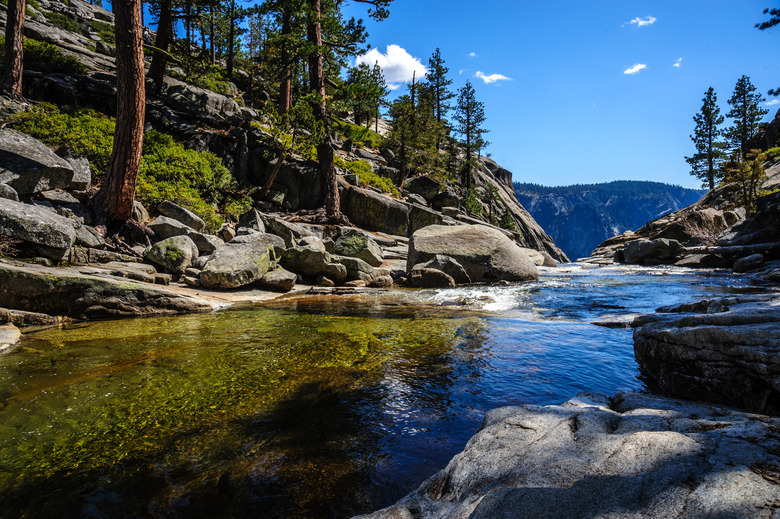How Fast Does Water Evaporate?
When a liquid substance turns into a gas, the process is called evaporation. The evaporation of water is the driving force for the atmosphere's water cycle. The world's oceans, seas, lakes and rivers provide nearly 90 percent of the moisture in the atmosphere via evaporation. On a much smaller scale, you can carry out a simple experiment at home to establish how long it takes for water to evaporate, and what factors speed up the process.
Purity of the Water
Purity of the Water
Pure or distilled water evaporates faster than saltwater and other types of impure water. Saltwater has another substance dissolved in it (salt), so its particles attach themselves to the water molecules, making them heavier and in need of more energy to escape the surface.
Surface Area of the Water
Surface Area of the Water
The greater the surface area of the water, the faster it evaporates. You can see this for yourself by observing two containers of water. Water in a very tall container with a small top surface takes much longer to evaporate than water in a large, shallow container. If the surface area is so large that the water is only one molecule deep, it evaporates almost immediately.
Temperature of the Water
Temperature of the Water
Hot water evaporates faster than cold water because the molecules of hot water have more energy to escape the surface and turn into a gas molecule. When a water molecule does this, the molecule becomes a molecule of water vapor (or steam).
Relative Humidity of the Air
Relative Humidity of the Air
The amount of water in the air as a fraction of the total amount the air can hold when it is saturated is called relative humidity. The more humid the air immediately above the water is, the longer it takes to evaporate because if the air is already filled with water vapor, it cannot accommodate extra vapor. For example, if you live in the desert, the water evaporates much faster in an area with no other water than it does if the water is next to a lake.
There are too many variables as basic data to provide an exhaustive answer to the question, how fast does water evaporate? Also, each of the above variables work together to affect the rate of evaporation. For example, when temperature and humidity are steady and wind speed increases, the rate of evaporation also increases. When temperature and wind speed are steady, but humidity increases, the rate of evaporation decreases.
If you are carrying out your own evaporation experiment, you can speed up the process in several ways. Use pure or distilled water and increase the surface area by placing it water in a shallow tray. Choose a tray made of metal, as this is a good conductor of heat and will help to prevent the water from cooling down as it evaporates. Increase the temperature of the water by blowing warm air over it with a fan.
Cite This Article
MLA
Gillespie, Claire. "How Fast Does Water Evaporate?" sciencing.com, https://www.sciencing.com/fast-water-evaporate-5194613/. 26 April 2018.
APA
Gillespie, Claire. (2018, April 26). How Fast Does Water Evaporate?. sciencing.com. Retrieved from https://www.sciencing.com/fast-water-evaporate-5194613/
Chicago
Gillespie, Claire. How Fast Does Water Evaporate? last modified March 24, 2022. https://www.sciencing.com/fast-water-evaporate-5194613/
